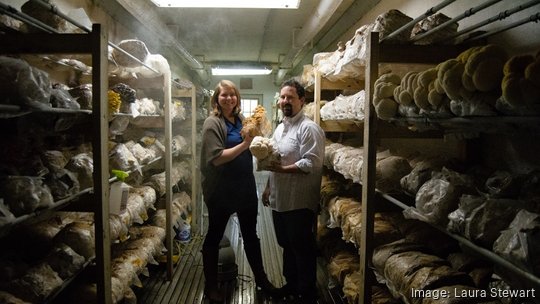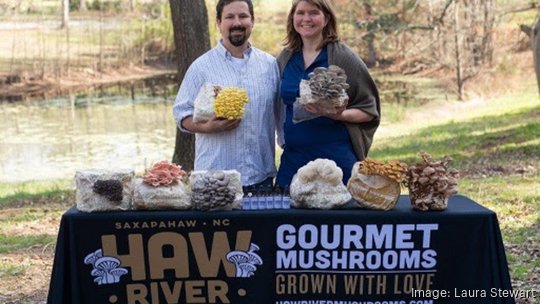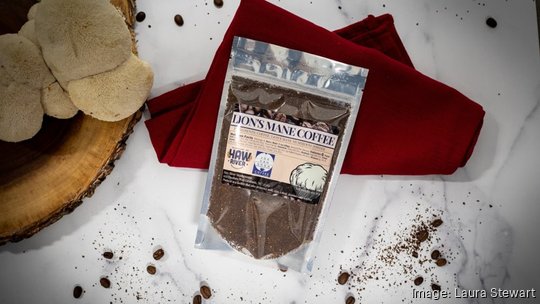
Fresh mushrooms and “curious treats" is how Laura Stewart, co-founder of Haw River Mushrooms and food startup Gnome Foods, describes the business she and her husband grew from the ground up.
Gnome Foods isn’t just pumping out specialty mushrooms for your stir-fries – it’s also working to crack the code on tasty meat alternatives by making “crab” cakes that use lion’s mane mushrooms instead of crustaceans.
And it's ambitions are high. In an interview, Stewart walks us through how she went from teacher to farmer to entrepreneur – and what’s next for the homegrown startup in Saxaphaw that got its start at a Pittsboro Farmer’s Market 11 years ago.
Stewart was a teacher in Ohio when she met her future husband, Ches, at an Episcopal Church – a man with aspirations of being a farmer.
The meet-cute, which happened on Chet’s first day attending the church, would set the course for her entire life – and not just due to their eventual marriage. The pair decided to make the farm dream happen and started to scout areas with more moderate climates such as Tennessee and North Carolina. They knew they would need to work full time to fund their ambition, and Ches Stewart’s job offer in Greensboro made the decision easy.
“It turned out to be quite a lucky choice,” Laura said.

Laura, whose background is in sociology, was teaching educational technology to K-12 teachers. On the side, the pair leased land from an established farmer and started planting produce such as lettuce and radicchio, selling it at a small farmer’s market in Pittsboro. But it was slow going.
The dream was to be full-time farmers – but it wasn’t happening with the produce stand. So they decided to kick it up a notch and took a class on growing mushrooms. Laura was hooked, starting a rabbit hole of research, and Haw River Mushrooms began.
They began by selling oyster mushrooms at the farmers market but soon became transfixed by other varieties – such as lion’s mane – a mushroom she had never heard of in the early days but that is today one of the firm’s core crops.
The pair switched the entire focus to mushrooms, starting by inoculating 250 hardwood logs – but the process was inconsistent. Some weeks they’d have 250 pounds of shiitakes – other weeks, none.
“We knew if we were going full time, we would need to build consistency,” she said. They experimented by building a high tunnel operation and inoculating it with spores every six weeks – that way, whether it was the middle of winter or the height of summer, yields were coming in.
But they weren’t the huge yields they had gotten with the logs – so they got creative again.
Shipping container by shipping container
“As first generation farmers, one of the biggest barriers to entry is access to land,” she said.
In 2014, the couple bought their first property – three acres including their home. Suitable land accounted for less than an acre – and Stewart said they used every inch, building it up modular-style with the help of YouTube videos.
The first shipping container, bought with an $8,000 grant check, became a “climate-controlled grow room.” The pair tacked up refrigerator panels and lined it with a waterproof barrier and blue lights (they use full spectrum light today). As mushrooms – like people – “exhale” carbon dioxide, they had to install exhaust fans for air exchange, as well as equipment for temperature control.
When they could afford it, they added a refrigerated trailer, then another one, repeating the model, “literally in our front yard.”
By 2017, they were able to be full-time farmers. By 2020, they were able to move to a 17-acre property and construct a dedicated growing facility. An advantage of the modular approach?
“We were able to bring them all with us,” she said. The first shipping container is now attached to a steam generator so it can pasteurize product. The refrigerator trailers are now incubator space for spores.

The transition from farming to foodpreneur was also gradual – and really started in 2016 with the birth of their twin daughters. By that point, the pair had been working at farmers markets for five years. In order to sell customers on unfamiliar varietals, they were hooking up little stoves at their stand, sautéing mushrooms in butter and pushing out samples. But the idea of a gas stove around babies was less than appealing for the new parents. So they got creative, opting to make a jerky out of their oyster mushrooms instead so customers could snag a taste.
And it was tasty – so tasty that they realized it could be a business.
As with farming, they started small, signing on to use a shared-use kitchen facility in Hillsborough to make jerky. On a whim, they entered it into the 2020 Specialty Food Association’s sofi Awards – and won two of the four awards in their category, including best new product.
The win gave them visibility – and the confidence to ask themselves, what else can we do?
What’s next
The pair expanded the lineup to offer products such as umami salts, lion’s mane “crab cakes” and even lion’s mane coffee. And it’s in the process today of adding five additional mushroom varieties to the coffee line, as well as a she-crab soup and a cream of coconut mushroom soup.
The products, made at Burlington Food Hall, are sold at four farmers markets including the State Farmers Market in Raleigh. The shelf-stable products such as the salts also ship nationally. But the pair have bolder ambitions.
“We’re currently reaching out to investors to pitch for some capital to expand,” she said.
The company, which has won about $200,000 in grants since its inception in 2011, envisions hiring staff and building inventory to support the volume that would be required to pitch to a store such as Lowes Foods or Whole Foods (Nasdaq: AMZN).
While they’re starting with small, specialty retailers, such as Weaver Street Co-op, which is about to take on its product lines, the goal is to take the company even further.
“All our recipes are scalable,” she said.
The company, which also operates a store at its Saxaphaw farm, has one full-time employee and 12 part-time employees and is still selling prepared foods under the Haw River brand. But it recently established the LLC for Gnome Foods for those product lines, inspired by the mythical creatures that share mythology around mushrooms.